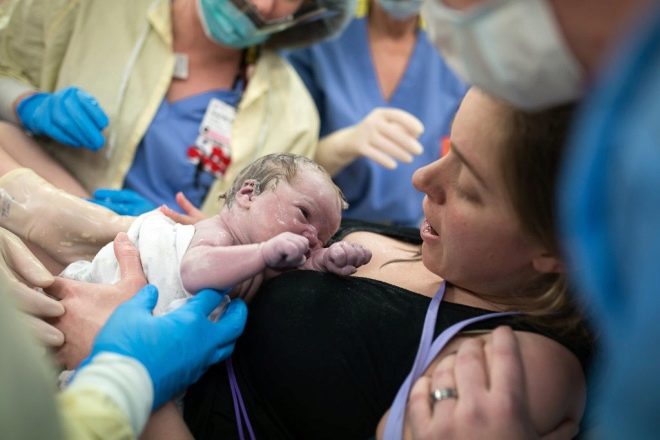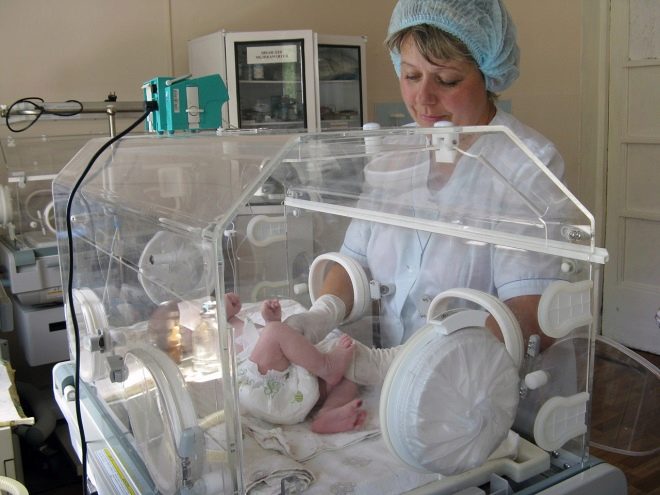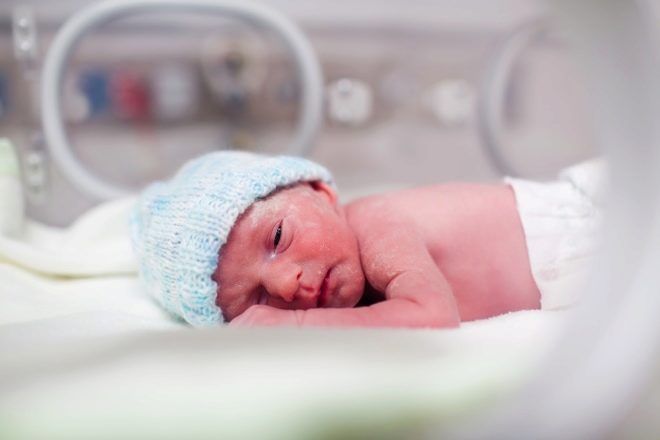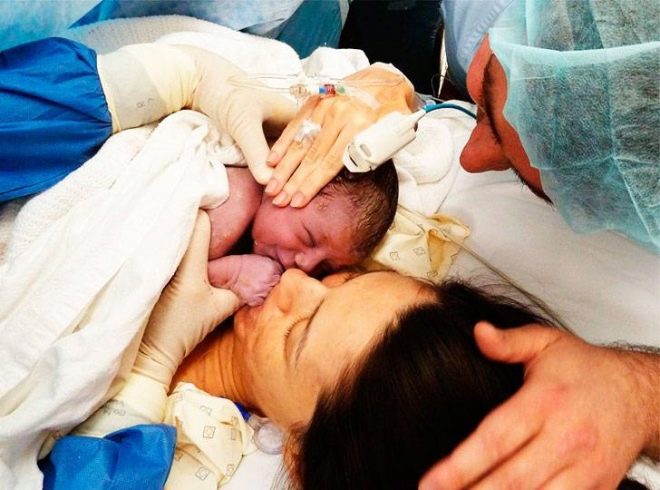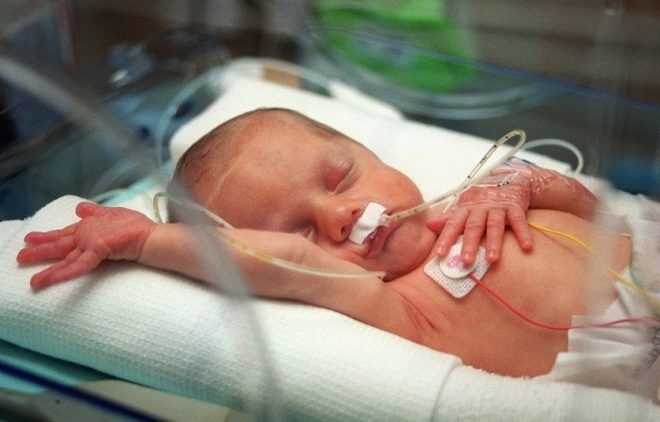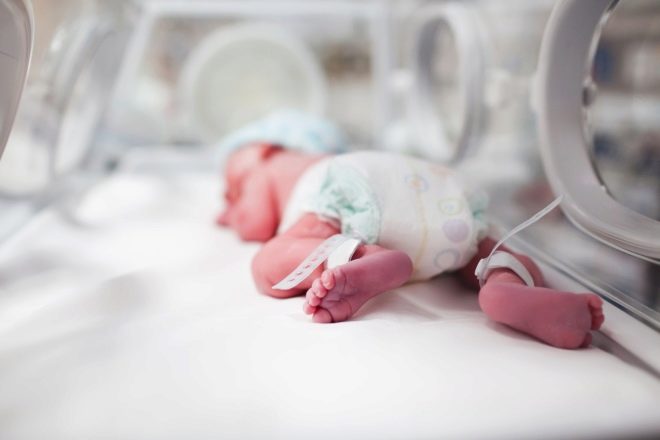Birth in the 34th week of pregnancy
Even very responsible and fulfilling all the recommendations of the doctor women are not insured from childbirth ahead of time, because the reasons may be very different. In this article you will learn why childbirth begins at the 34th week of pregnancy, as well as how they proceed and what are dangerous to the mother and fetus.
Opinions of doctors about the term
33–34 weeks of gestation is almost eight calendar months of gestation. There is still about 6 weeks, almost a month and a half, until the date of birth, which was identified as the intended one. And it is clear that a woman does not think about the possibility of going to the maternity hospital right now. But circumstances may arise in such a way that childbirth will begin spontaneously or else the doctors will have an urgent need to terminate the pregnancy, since it can be a mortal danger to the woman or her child.
Regardless of the reasons why a woman will be in the hospital at week 34, childbirth will be considered premature. In order for childbirth to be considered urgent, it is necessary to inform the child at least up to 37 full weeks. But despite the fact that it is still desirable for the baby to spend several weeks in the womb, giving birth in the current term will not be as dangerous as, for example, two weeks earlier.
Today, resuscitation training and the level of resuscitation equipment allow nursing even babies with deep degrees of prematurity in serious condition and with extremely low weight (from 500 grams and sometimes even lower). At 34 weeks, the child has enough weight to survive, but there are some nuances, since premature babies are a special category.
Child development and vitality
At 34 weeks, the child is rapidly gaining weight, and this is a very important process. The presence of sufficient body weight, a sufficient amount of subcutaneous fatty tissue will help the baby after birth to maintain internal body heat and prevent severe and dangerous systemic hypothermia, and therefore doctors will try to do everything to extend the pregnancy even for a few days if the woman enters the hospital in threatening or beginning preterm labor. If childbirth already belongs to the category started, then stop or slow them down will not work.
This week, most children have an average weight of 2 kilograms, there are heroes who already weigh over 2.5 kilograms. But there are also little children, whose weight can not reach to one and a half kilograms. Often, unfavorable factors that provoke the onset of labor before the onset of the prescribed period also affect the fetus, and therefore premature babies do not always have average statistics for height and weight.
If a child appears on this period, he will be able to please his mother in moderately rounded forms, the presence of small cheeks and even a plump booty. By this week, a certain amount of subcutaneous tissue had already been deposited, and due to this, the child stopped looking hypotrophic.
There is almost no doubt that the baby will be born in a cheese-like lubricant, it is she who covers the body of the babies until the skin matures. By this time, the lubricant is only beginning to gradually decrease. Also, the baby can be born with the remnants of light and very thin hair on the body - lanugo also has not completely left the skin of the child.
In the brain of a child, the process of differentiation of the cortex is almost complete, but the key word is “almost.” The birth of a child at this time will somewhat slow down and disrupt these subtle processes, which can be expressed by the neurological ailments of a wide variety of species.
A child has all the reflexes necessary for survival in a different habitat. But due to insufficient maturity of the brain at birth at this time, weakness in the manifestation of reflex "skills" is not excluded.
If a boy is born, then it is highly likely that his testicles are already descended into the scrotum. Internal organs grow, their formation was completed in the first trimester. A child born at this time can eat, drink, write, his liver and heart, as well as other organs, work non-stop. But the main, from the point of view of neonatologists, the process takes place in the lungs.
Lung tissue at 33–34 weeks accumulates surfactant - a substance that produces small bubbles - the alveoli. The more surfactant accumulates at the time of the child's birth, the higher the likelihood that at the time of the first independent inhalation, the baby's lungs will open, not stick together, will be able to exercise their basic functions of gas exchange, the child will be able to breathe.
If you arrive at the maternity hospital on time, then doctors can still have time to prepare the baby’s lungs for birth. If, according to the ultrasound, there is insufficient maturity, the woman will be given drugs with an artificial surfactant. The same will enter the child after he is born.
Kids who cannot sit in their mother's womb and who have decided to be born at 33–34 weeks are considered quite viable. In most cases, they are awarded a second degree of prematurity according to international classification. This means that the predictions for the future are not as good as in children from the first group, but also not as alarming as in children of groups 3 and 4 in terms of the degree of prematurity.
Home birth and refusal of medical assistance at this time can kill the child. He cannot do without specialized medical care. In the conditions of a modern maternity hospital or perinatal center, 97% of children born at 33–34 weeks survive. In most cases, after rendering early neonatal care, they grow quite strong and healthy. 5% of children born at this time still have abnormalities, mainly of a neurological nature. 1% of children born between 33 and 34 weeks are disabled due to total and irreversible damage. The percentage of stillbirth at this period is about 0.6%.
A baby born at 34 weeks is more likely to need the help of resuscitators and neonatologists. He can spend several days in a special crib with heating, since he needs additional warming. If necessary, an artificial respiration apparatus may be connected, oxygen supply and probe feeding are organized.
Causes and characteristics of labor
Births at 33–34 weeks can begin spontaneously. In this case, the woman can either feel the appearance of regular uterine contractions, the frequency and strength of which will increase, or will immediately face the discharge of water. According to statistics, at the beginning of labor, amniotic fluid is withdrawn from 10% of women during full-term pregnancy. In the case of prematurity, the connection is monitored more disturbing: 40% of preterm labor begins with the discharge of water.
In any case - it is impossible to delay. The sooner a woman calls an ambulance and goes to the maternity hospital, the better: it is possible that doctors will still have the opportunity to prolong the pregnancy.
As for the reasons why labor starts prematurely, it is usually:
- infectious and non-infectious diseases of the uterus, ovaries, cervix;
- multiple pregnancy (gestation of twins, triplets);
- endocrine disruption;
- chronic diseases of the internal organs of the mother;
- abnormal development of the baby, including chromosomal;
- viral infectious diseases suffered during pregnancy;
- smoking, taking alcohol or drugs;
- unfavorable ecological situation;
- stress;
- fall, blunt abdominal trauma.
Implications and predictions
For women, childbirth at 34 weeks is almost the same as during full-term pregnancy. The risks of complications in the process of childbirth are almost the same, but still some of them are elevated. In particular, cervical and perineal ruptures in preterm babies are more likely to occur due to physiological immaturity and unreadiness of the genital tract to give birth. Risks of generic weakness or rapid delivery are increased.
For babies, the effects may be more significant. With low body weight, it is possible that thermoregulation will be impaired. If there is a shortage of surfactant, breathing problems may occur. Both of these problems are treatable by timely medical care. Often in premature babies, due to the immaturity of the brain structures, hemorrhage occurs in certain parts of the organ, which can have very sad consequences commensurate with the degree of damage to the central nervous system: from minor neurological abnormalities to the development of cerebral palsy, paresis, brain disorders, mental and mental deviations.
In general, it is rather difficult to predict anything. Each premature baby is individual, and it has its own risk factors and aggravating circumstances. But in general, children at this time adapt well to new conditions, and therefore there is every chance that the child will be alive and healthy.
Reviews
Women whose birth occurred at the 34th week of pregnancy, on thematic forums on the Internet, write that everything ended well. In the maternity hospital, of course, I had to lie longer, and even the neurologist then followed the children for at least one year - these are the rules. But on the whole, children born on such a period gain weight well, quickly take the breast, and by six months they fully catch up in weight and height, as well as in the developmental standards of their peers.
Rumors, widespread among the people, that the eight-month survive worse, medicine does not confirm.
About preterm birth at 34-36 week, see the following video.

